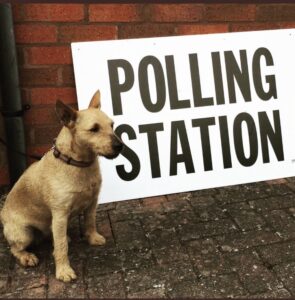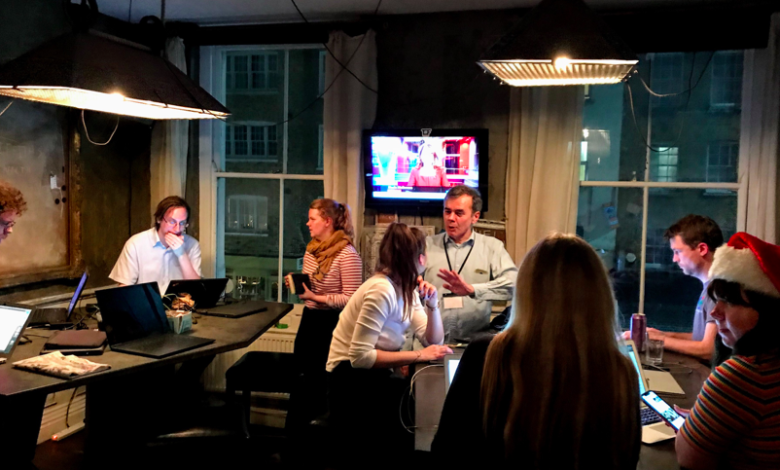
The night of chaos and mince pies at Wikipedia UK General Election 2019 edit night
What is Wikipedia editathon?
A gathering of Wiki editors for a live edit session, sometimes overnight, with some contributors attending in-person, while others monitor and improve pages remotely from home. We are a sociable bunch so it is motivating to work together on themes for specific events.
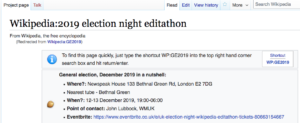
What is special about General Election editathon?
As always on the night of general elections Wikipedia, editors gather in Newspeak House, a boisterous Civic Technology club in Brick Lane in deep East London. This year elections fell in the run up to Xmas so we all brought Santa hats and Xmas jumpers, while Newspeak House and Wikimedia UK supplied a big pot of mulled wine with cinnamon, while Cybersalon contributed organic mince pies.
Who participates in election night editathons?
John Lubbock from Wikimedia UK organised the session so together with our Middlesex University circle of Wiki editors we gathered for the night, as we did for the last 3 elections. The aim is to ensure prompt, accurate and well balanced coverage of the incoming MPs, update outgoing MPs (as well as swap tall stories and share editing tips with rookie editors). Middlesex Uni was represented by Denisa Moise and the rest of us were from We Make Websites (Karolina Janicka) and Cybersalon.org. Andrew Grey and Ed Hands with a few other ‘old hands’ were overseeing the edit process to ensure quality.
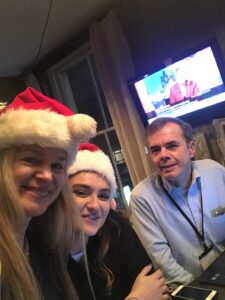
Wikipedia is mainly edited by men, is your edit group different?
Our edit group has 40% of women, with interest in pages for new MPs, particularly in female MPs pages. Despite some progress in women participation in professional politics, women are still a minority in House of Commons. This year is the highest it has ever been but still only 34% of the House are women.
Of those, Labour got in a stonking 104 women, more than half of their 2019 cohort, while Conservatives have only 25% of women MPs (87) and no clear signs of that outdated ratio improving.
Are editathons sponsored?
Venues where we edit and food for gatherings are supported by Cybersalon.org and DigitalLiberties.coop, as well as Newspeak House. All those organisations are non-profits that focus on Technology For Good. Tonight we use it for supporting Women in Politics. We cook, chat and edit as part of educating new editors and encouraging female participation in scrutiny of professional politics. General Election edithatons are popularising Women MPs thru verified and supportive edits of their Wiki pages, and although we never shy of including known Controversies, a fair discussion is always held to evaluate relevance of information and maintaining a positive stand. Wikipedia does not accept donations from political parties.
What was the first challenge of this editathon?
So many newbies MPs with zero digital footprint! We usually prepare a few dozens of new women MPs pages in advance, to make sure we have time to dig around, find references and present the pages in an objective way so the ladies are presented not in any less detail than male MPs (often an issue, particularly since 2017 when many new women MPs for Labour were very young and not from political background, not notable and with very limited digital footprint).

This was team’s third election so we have a process agreed now, and we got together with our team leader Editor Ed Hands a few days in advance to create Most Likely candidates’ list that were in so called ‘Safe Seats’ or had over 60% chance to get elected.
One of the challenges to cover all new people amongst the 650 seats, was that over 200 wards were expected to change MPs, where Labour was predicted to gain 18, Lib Dems expected 5 gains, SNP expected 4 gains. That is a lot of new pages. What we struggled with was that most of the newcomers were not known, had no previous press coverage and were not notable. We simply couldn’t build pages for them before the event, as lack of notability would result in the pages being taken down. This was particularly the case with Labour incoming MPs, who were on the whole younger with less professional record than Conservative candidates.
With some research we managed to pre-prepare the pages even when the information on the incoming women MPs was very sparse due to their youth and lack of professional notability pre-politics..
With Ed, Denisa and Karolina we researched and listed 24 women to start with to enable us to focus on preparing the most likely gainers.
This year was particularly tricky time-wise as well as exciting as Labour has put up the longest list of female candidates, with 49% of MPs in just London Labour seats predicted to be female – that was a lot of new pages for us to build!
Similar as in 2017, many new SNP female candidates were technically not ‘notable’ so it was not possible to pre-edit their pages. As their party was achieving gains thru the night, a rapid edit team had to be put together to provide a fast update as the results were coming in, one very visible being the replacement of Jo Swinson with a SNP newcomer , young Amy Callaghan. It was also becoming clear that Scotland voted on Brexit rather than for particular MPs, as the new SNP candidates were generally less experienced with less achievement record than the losing candidates (as it was the case with Jo).
Can you give me an example of non-notable candidate?
There were many. This year one example was Rachel Hopkins, elected to Luton South as incoming MP. She has only previously worked as town councillor, with no notable references to evidence her achievements. Rachel’s Dad, Kelvin Hopkins however was very notable, a member of Socialist Campaign Group, on the deep left of the party and was one of the 36 MPs who nominated Jeremy Corbyn to leadership battle in 2015 but stood down in 2019 due to sexual misconduct allegations. Rachel is related to left group in the party and was put to the seat when Gavin Shukar, a centrist, has resigned Labour whip on the grounds of Brexit and anti-semitism in the party . Rachel has taken on the safe seat but with little notice, with no previous political achievement history and low notability.
Our prep for her had to be done in Draft and then once the results were announced, swiftly moved into main Wikipedia space, when her elected status will be enough to stop other editors from removing their pages due to previous low notability and thus avoiding Edit Wars at 2am in the morning!
Were candidates in 2015 more ‘notable’ or with higher achievement pre election than in 2017 or 2019?
Yes, it was remarkable that we did not have this low notability issue in 2015 general elections, where the new candidates for Labour, LibDems and Conservatives were significantly more notable in their own right, often with considerable set of achievements documented by local and national press which made it possible to create full pages for them even well before the General Elections. However, maybe It is a good trend that younger people, especially younger women come into professional politics. We just have to be aware they may need more of a stronger support system once in the House of Commons.
One of 2020 research projects I am working on is to keep a watch on all the rookie female MPs intake from 2015, 2017 and now 2019 is to see if their lack of pre-selection experience can be bridged by post-election support and how can we improve their chances of sustaining a political career beyond a single parliamentary session.
We look how they are performing as comparing to more experienced incoming MPs who were notable before the elections. So far the picture is mixed but that is for another editathon! Rookies we are following will be SNP MP Amy Callaghan who replaced Jo Swinson, and Charlotte Nichols, self-declared socialist who replaced a more centrist Helen Jones in Warrington North.
We will also be analysing the demise of Laura Pidcock, a Corbynista who has just been removed from her seat by a Conservative Richard Holden Laura was the lead proponent of bringing student politics and class war to House of Commons, while investing less time on supporting her local community and building a reputation as a solid local MP – possibly one of the reasons for her loss of the seat. There was a major edit war about the phrase on her page noting her loss – it was edited as ‘was’ a British politician versus ‘is’ a British politician – as some editors took a view that once out of House of Commons, Laura is not a professional politician any more, while other noted ‘she is not dead’ so still a politician (the debate is ongoing) ;-)
What is the difference in covering female versus male rookie MPs?
Reporting in a balanced and measured manner is our aim – made harder as some candidates from Momentum came with significant Controversy that needs to be reflected on the pages. As we focus on female politicians, we aim to create as accurate and positive reflection of their Early Career as possible, recognising that due to years spend on maternity leave or childcare, their achievements are often less significant or “notable’ than similar age men. We often spend time fishing out the charity and non-profit contributions that those new candidates have achieved in the absence of professional achievements.
Those alternative activities are often documented less than comparable work achievements in business or professional politics by male MPs, so it is harder to get notability for female MPs and takes longer to research.
This year we also noted a demise of local press caused a lot of problems as national press just does not cover the local candidates, so very little is known about them. The knowledge is often restricted to Twitter-sphere, not exactly the most reliable platform.
What do you do when a female candidate finds herself with Controversy?
Wikipedia brief is to be objective and serve transparency. Some candidates came with quite a colourful background, what is reflected on their new pages. The issue is that alleged goings-on, murky selection processes and opaque experience need to be revealed but in a transparent manner. The discussions then take place what is and is not relevant, which negative press articles are only allegations and which are relevant. This is always done in a constructive atmosphere to eliminate partisan feelings amongst editors. What stays on the page is what we all agree on, so pages often ‘shrink’ by the time consensus is reached.
Can you give me an example of Controversy?
We always cover Poplar and Limehouse first, as Newspeak House is in Bethnal Green Road so our local ward. We were delighted to see a young women Apsana Begum.
elected as MP for the area. Her is a complex story, with backing from both Momentum as well as discredited previous leadership of Tower Hamlets. Previous MP Jim Fitzpatrick was a centrist and was deselected by Momentum activists. Apsana is under investigation as she has obtained a priority in allocation of a council flat in an area where the waiting list is 19,000, and typically only large families would be given accommodation. She has obtained accommodation as a single woman, a rare case in Poplar so it was decided to include those well documented investigations in her page. It was also noted that her election as a candidate was conducted from a shortlist of just 2 women, another unusual wrinkle in the typically much different selection process.
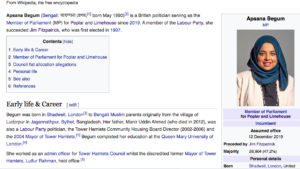
Which candidate excites you most from this year intake?
Kim Johnson, who is the first selected black MP from Liverpool. As Liverpool can be proud of hosting the oldest black community in UK, it is surprising it took so long to get a local member to represent them. Kim seems a very energetic and talented leader, with deep local knowledge and we will be rooting for her as only 10% of MPs in the current 2019 MP intake are from BAME community (65 MPs).
Labour, which Kim represents has a higher proportion of BAME MPs, at about 20% with Conservatives and LibDems very much behind.
Any own goals by Labour that your team has noted?
Possible something of an own goal was pushing out the centrists MPs like Tom Watson or Ian Austin (Dudley North). Tom would have won West Bromwich East without problem as he was a much loved local MP with a good majority. Once he stepped down under pressure from Momentum, Labour’s replacement candidate was not notable and the seat went to an up-and-coming young Conservative.
The winner in fact was the youngest and impressive new Conservative MP Nicola Richards
We are excited about her coming to the House at just under 24 years old, barely 2 years out of college. But her local constituents will need to wait for her to get some experience before she can bring them the same level of resource to match that of Tom Watson. In Dudley North, vacated in a similar centrist deselection by Ian Austin, a very strong local Conservative candidate pounced on the chance and snapped the victory by the thinnest of margin, turning a long tradition of Labour seat into a new Conservative gain.
Lesson learned is possibly that Labour party needs to be a broad church, allowing more shades of gray of values to hold on to their strong, diverse, experienced MPs who would have carried their wards regardless of National politics.
To finish, I noticed you edited many Labour and Lib Dem female new MPs, was there any female candidate on Conservative bench that you liked?
Ruth Edwards who has taken over Rushcliff after Ken Clarke’s retirement, seems an accomplished lady. Her background is in IT and cybersecurity, as she was previously cybersecurity adviser in Deloitte and BT. It is exciting to see people who had a previous successful life before politics as they should be able to hold their own line, not just being yes women or men to their party line or Prime Minister. Ruth has won an award for mentoring young women coming into Tech and I am hoping she will fight for better working terms for women in technology companies as this is sector that is even less women-friendly than politics. It was typical of Wikipedia male editors that my edit including her Award for mentoring women was deleted! This is something that I will pick up this week on the editors’ review session.
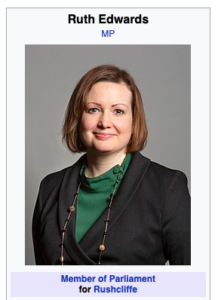
Any advice for the incoming rookie female MPs?
These are turbulent times in politics and not a time to be a lone ranger. Teamwork is dreamwork! The most successful female MPs that we track are those who work well in teams, form alliances around their favourite bills and use the collective force to get their bills thru. Chi Onwurah who was the first black MP in Newcastle is one of the great examples of alliance driving. She is the only MP engineer in Labour party and a political survivor, having backed a different leader to Jeremy Corbyn but stayed on his front bench. She is a real team worker and works across the parties an improving efficiency of government tech procurement and also improving women access to technology–based careers and in scrutiny of tech companies in UK as vice chair of Pictfor.
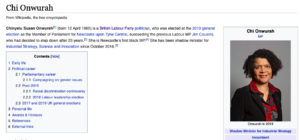
Before the election day:
And after… (losing the seat to a Labour challenger in a massive drop of his followers)
Good luck to all new rookie MPs, both male and females! Hope this new Parliament will provide fertile grounds for those newbies to blossom and transform into fabulous political stars of 2020!
If you are interested in learning to edit, or have a project that may improve Wikipedia coverage of MPs, please get in touch.
Thank you and go and check out Wikipedia pages for all female rookie MPs – cohort 2019!
And don’t forget to check Dogs at the Polling station Wikipedia page!
